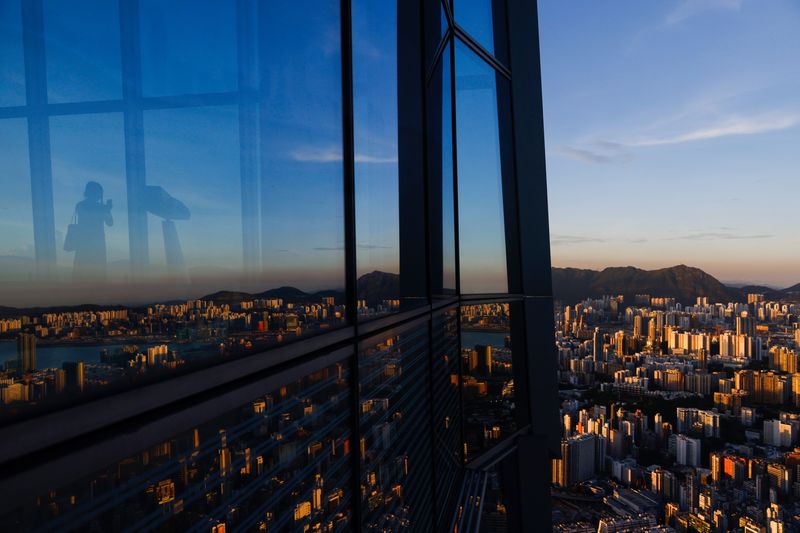Hong Kong police keep tight tabs on first authorised protest in years
2023.03.26 02:18

© Reuters. FILE PHOTO: A general view of skyline buildings, in Hong Kong, China July 13, 2021. REUTERS/Tyrone Siu
HONG KONG (Reuters) – Hong Kong police on Sunday permitted a small protest march under tight restrictions in one of the first demonstrations to be approved since the enactment of a sweeping national security law in 2020.
Several dozen demonstrators were required to wear numbered lanyards and were barred from wearing masks, as police monitored their march against a proposed land reclamation and rubbish processing project.
Participants chanted slogans against the reclamation project as they marched in the rain with banners in the eastern district of Tseung Kwan O, where the project is slated to be built.
Some also criticised the restrictions on their protest, which included a maximum of 100 participants, according to a seven-page letter from police to organisers, seen by Reuters.
“We need to have a more free-spirited protest culture,” said James Ockenden, 49, who was marching with his three children.
“But this is all pre-arranged and numbered and it just destroys the culture and will put people off from coming for sure.”
Police granted the organisers a “no objection” letter for the protest on the condition they ensure it would not violate national security laws, including seditious displays or speech.
“Some lawbreakers may mix into the public meeting and procession to disrupt public order or even engage in illegal violence,” the police warned in their letter.
Organisers said up to 50 people took part in the first protest to be authorised by the city’s police for several years.
Applications for other protests, including a candlelight vigil on June 4 to commemorate the victims of China’s Tiananmen Square crackdown in 1989, have been denied on grounds related to COVID social-distancing.
The last of Hong Kong’s COVID restrictions was scrapped this year, following China’s decision to end its “zero-COVID” policies.
Hong Kong’s mini-constitution, the Basic Law, guarantees the right to public assembly.
Since the China-imposed national security law, enacted in June 2020 in response to protracted pro-democracy protests in 2019, authorities have clamped down on freedoms and arrested scores of opposition politicians and activists.
Some Western governments have criticised the law as a tool of repression but Chinese authorities say it has restored stability to the financial hub.
One protester surnamed Chiu, 50, said she appreciated the chance to protest “in difficult times”, and said she saw the lanyards more as a means to facilitate crowd management.
“It doesn’t mean putting a leash on us to restrict our expression. I think it’s acceptable,” she told Reuters.
This month, a women’s rights group cancelled a demonstration at the last minute after a police spokesman said some unspecified “violent groups” might join in.
Political observers and some Western diplomats are watching to see if authorities will allow a resumption of major demonstrations in Hong Kong, namely on June 4 and July 1, that had been a mainstay of the city’s once vibrant civil society scene and attracted thousands of people.








